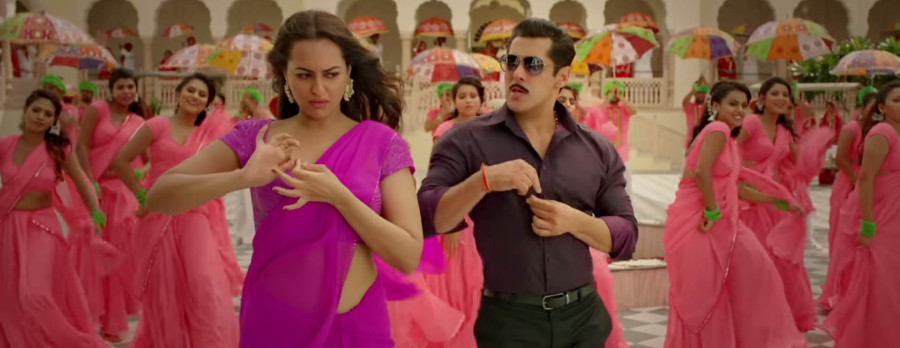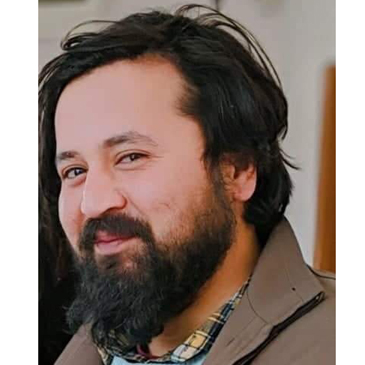Movies
'Dabangg 3' is abs, item songs and a script steeped in patriarchy
Salman Khan is a superstar in the truest meaning of the word. But it's time he reevaluates his ideas on society and on cinema.
Abhimanyu Dixit
[Editor’s note: This review contains spoilers. Read on at your own risk.]
I remember watching the first Dabangg with a sprained ankle. For most of its runtime, I had such a good time that I completely forgot my hurting leg. I was laughing really hard. Besides being an entertainer, Dabangg was also a big learning experience for me, because as a fresh graduate and an aspiring filmmaker, it was everything my schooling taught me not to do. I was trained that films were a serious business and that everything needed to make sense. But Dabangg broke all film school laws—it didn’t want you to take anything seriously. Yet, I enjoyed the film—so much so that I felt guilty. But with the third installment now in theatres, I feel utterly insecure.
Let me explain.
In Dabangg, Salman Khan is Chulbul Pandey, a hero who is just as bad as the villain. It worked as a commentary on the stereotyped hero of yesteryear. Khan spoke with a Bihari accent, made toilet humour, synced his lips to foot tapping numbers, and performed over the top action sequences. The film was a massive hit. Khan rediscovered his comfort zone in the fast-paced anti-hero of the action-comedy genre. And that’s all we saw from this Khan in the last 10 years.
Throughout the 10 years and unlike his contemporaries, Khan has stuck to one genre, one character and one philosophy—patriarchy. In all his films, he plays a macho-man who fights the bad guys for the common people. The generic bad guy usually lusts after the heroine. Khan always plays a saviour for women, a messiah for the less fortunate, and lectures audiences on how to live. These characteristics have earned him a title of sorts, he’s Bhai, as in the big brother. And over the years, Khan seems to have embodied this ‘Bhai-ness’, because he has been judging and punishing people on television too—for that, watch Big Boss on Colors TV.
Now let’s get back to the film. As Dabangg progresses to Dabangg 3, the film is no different from any other Salman Khan film. But this time, the franchise is no longer a laugh riot, neither it is a commentary. And over the years, it has become offensive to watch, as it is filled with predictable sequences, and overtly patriarchal messaging.
Dabangg 3 takes us back to the origin of Chulbul Pandey. The film gives us an insight on how a Dhakkad Singh Pandey (Khan without the signature mustache) becomes Chulbul. Dhakkad falls in love with Khusi’s photograph (Saiee Manjrekar) and asks his parents to arrange his marriage with her. Dhakkad claims that he won’t accept any dowry, and instead promises to pay for Khusi’s education. She wants to become a doctor.
Khusi falls in love with Dhakkad but she doesn’t like his name, she suggests Chulbul and he accepts. And then, the bad guy enters. As expected, Balli Singh (Kiccha Sudeep) meets Khusi, and starts lusting after her. But Khusi loves Dhakkad, and so keeping alive the tradition of the 90s, Balli kidnaps Khusi, and hangs her on a tree overlooking a cliff. Sadly, Dhakkad is unable to save her, but like a true hero, vows revenge and enrolls in the police. He’s Officer Chulbul now, and somehow forgets the revenge plot with Balli Singh for the duration of two and a half Dabangg films. And it’s only in the second half of the third film that Chulbul decides to disrupt Balli’s evil empire, defeating his minions on one-on-one combat scenes. But Balli isn’t giving up and resorts to his old techniques of kidnapping Chulbul’s family members.
The film is written by Salman Khan, and he’s also one of the producers. And, like any other Salman Khan film, he does the obvious—showcases weird dance moves, wears a firoza (turquoise gemstone) strutted bracelet, and rips off his shirt to show his abs. The songs sound similar to all previous ones too. Dabangg had ‘Hud-Hud Dabangg’; this one has ‘Chulbul Dabangg’. The first film had only one song about eyes, ‘Tere Mast Mast Do Nain’, here we get two songs about eyes, ‘Naina Tere’ and ‘Habibi ki Nain’. The infamous item song, ‘Munni Badnam Hui’ has been updated to ‘Munna Badnam Hua’, but don’t be fooled by false marketing. It’s still an item song that sexualises Warina Hussain. Sohail Khan gets some screen time too—because family; Arbaaz Khan gets something resembling a character arc—because producer and family; and director Prabhu Deva makes a special guest appearance in a dance number, because that’s what he usually does.
Now, I like to believe that the world has changed since the first installment of Dabangg. And I’ve changed too. I’ve made some progress in my career as a filmmaker, and if I sprain my ankle today, I’ll be out of action for at least a week. But I’d like to believe I’ve learnt and grown as a person since the first Dabangg. I was part of a culture that saw no harm with item numbers, but I’ve learnt how these songs are mostly conceptualised by men and that they treat women as objects of sexual desires. I also thought eve-teasing was harmless. But I’ve learned that it is psychologically jarring for people (especially really young ones), who are on the receiving end. In the last 10 years, I’ve learned to be sensitive about my characters and issues, and I’ve learned to think about and respect female characters. At the same time, in all those years, I’d like to believe that patriarchy is a bit more relaxed. Men are under less pressure to become the sole breadwinner of the family.
Now, in his defense, Bhai doesn’t live under a rock. He’s aware of the social movements like #MeToo, and of the feminism wave in South Asia. Right before he kills Balli, Chulbul asks, (I’m paraphrasing) ‘So, if a girl doesn’t like you, you’ll kidnap her? Pour acid on her face? Or rape her?’ to which Balli replies, ‘Yes I will’, and so Chulbul kills him. Now, although I understand where he’s coming from, I truly believe sprinkling a few dialogues on social issues is just not enough.
These few lines, that was saved for the climax, will do nothing when the philosophy of your film is deeply rooted within patriarchy. And Bhai’s redundant dancing and acting style don’t help either. Salman Khan is a superstar in the truest meaning of the word. People will flock to the cinema only to see him. He has a cult following of people who not only want to look like him, but also subscribe to his ideas and want to emulate those. It’s high time he reevaluates his ideas on society and on cinema, because soon the Bhai-ness is going to reach a saturation point and he will lose everything he’s earned in the 30-or-so years of his career—solely for being lazy.
And the thing about me being insecure. Well, Bhai for the last 10 years has been promoting the idea that in order to be a man, you have to have a ripped body, be able to take on 10-15 bad guys in a single go, and be able to provide for every single person in the family. And I’m insecure because I don’t fit into any of Bhai’s definitions. The first rule seems rather unnecessary; the second one is ridiculous (and possible only for Bhai). As for the third one, if I were to ask my wife to stop working, just because as the man of the house, it is my job to provide for her, I don’t think it would go down well with her. Honestly, it wouldn’t with me either.
———-
1.5 out of 5
Starring: Salman Khan, Kiccha Sudeep
Story: Salman Khan
Director: Prabhu Deva




 9.83°C Kathmandu
9.83°C Kathmandu












